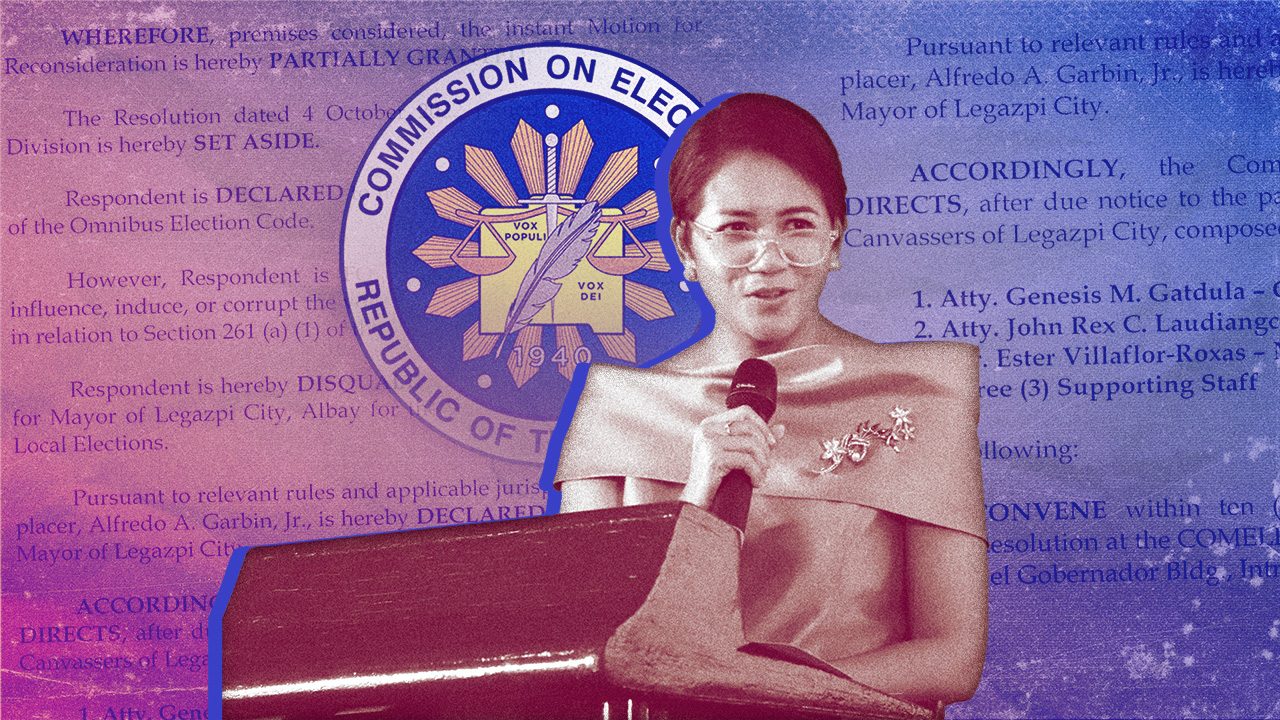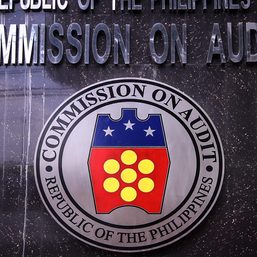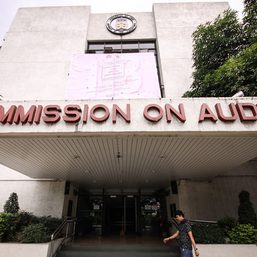SUMMARY
This is AI generated summarization, which may have errors. For context, always refer to the full article.

MANILA, Philippines – When the Commission on Elections (Comelec) tried to kick the mayor of Legazpi City out of office, it did away with convention and decided to replace her with her closest election opponent, not her vice mayor.
The way that the poll body justified the move confused numerous legal practitioners whom Rappler consulted with.
Some of them raised critical questions; others even went a step further and said the ruling was “problematic.”
Traditionally, it is the second-in-command who replaces election candidates who get the chop after they have assumed office, so why is this not the case in Legazpi city hall?
“It’s a problematic ruling,” said election lawyer Emil Marañon III.
Based on the Comelec’s final ruling, the designated successor of embattled Mayor Geraldine Rosal would be Alfredo Garbin Jr., a former congressman from party-list group Ako Bicol whom Rosal defeated by only around 500 votes in the 2022 mayoral race.
But if longstanding jurisprudence or even the rules of succession under the Local Government Code were followed, Vice Mayor Bobby Cristobal would have been proclaimed the new mayor.

Background of the case
The Comelec proclaimed Rosal as mayor in May 2022, and she assumed office in June. In October, a division of the poll body – composed of two commissioners – moved to disqualify her from the race she had won.
The commission found that she violated the election code provision against spending of public funds during the campaign period. The ill-fated event was a cash distribution activity for tricycle drivers.
She was not yet a public official at the time, but the Comelec deemed her an accomplice who benefited from the event, given that it was her husband – then-outgoing mayor Noel Rosal – who approved the disbursement of public funds.
The Comelec at the time, however, cleared her of vote-buying allegations.
The disqualification order was appealable, so Rosal formally called on the Comelec – via the seven-member en banc – to reconsider her case. At this level, five commissioners who previously did not have a say on the case got to weigh in.
Seven long months later, the Comelec finally came out with an en banc resolution. All seven members in May 2023 were unanimous in disqualifying Rosal.
The resolution, however, set aside the division ruling, saying that Rosal could not be held liable for violating the public spending ban during campaign period simply because she was not yet in office at the time.
But the Comelec, in a turnaround, said she engaged in vote-buying activities because of (1) her ties to the event, and (2) her decision to justify her presence, instead of distancing herself from it.

Where it gets tricky
The 17-page ruling spent only two pages justifying why the mayoral election’s second placer, and not the incumbent vice mayor, should replace Rosal.
Comelec spokesman Rex Laudiangco told Rappler that the ruling meant that the votes garnered by Rosal were considered stray.
But the ruling did not explicitly say it moved to invalidate votes cast for Rosal, and why so, when her certificate of candidacy (COC) was not nullified to begin with.
For context, as lawyers consulted by Rappler explained, second placers in elections usually take over when a person’s certificate of candidacy is declared void. Often, it’s because a candidate made misrepresentations in that important piece of paper. In the eyes of the law, the election’s first placer was never a candidate at all.
But in disqualification petitions granted by the commission, the Comelec recognizes a politician’s candidacy as valid. So even when they are disqualified for committing an election violation, they are still considered a legitimate candidate whom the voters wanted to win, not the second placer. That is why the winner of the next highest position takes over – in this case, the winning vice mayoral candidate.
A few exceptions
In rare instances, the second placer ends up replacing a candidate who loses a disqualification case, but these are complex cases that usually also involve the element of a nullified COC.
Nonetheless, the Comelec ruling cited four Supreme Court resolutions that favored the second placer as successor instead of the second-in-command.
The way the Comelec wrote it? It lifted one paragraph each from four Supreme Court rulings, and introduced them one after another using only short sentences.
“The Comelec could explain it better because they carved out portions that would suit the ruling, but didn’t really explain how this is applicable,” election lawyer Ray Paolo Santiago told Rappler.
Romulo Macalintal, lawyer of the Rosals, used tougher words: “Irrelevant, not applicable. They committed an arbitrary and grave abuse of discretion in referring to those cases because those cases do not refer to straight disqualification.”
Issue of ‘notoriety’
One Supreme Court ruling cited was Talaga v Comelec in 2012. There, the High Court said that a second placer may succeed a disqualified candidate if the electorate is fully aware of the candidate’s “notoriety.”
This means voters understand that they are in effect waiving the validity of their votes if their preferred candidate is disqualified.
Poll spokesman Laudiangco told Rappler: “The commission en banc ruled further that the voters are fully aware of this fact, with such awareness bounding on notoriety, but nonetheless voted for her, knowing fully well of an impending disqualification and ineligibility.”
The ponencia, however, was not explicit about that, leaving readers to interpret how exactly the electorate would have been aware of Rosal’s “impending disqualification.”
While the disqualification petition against Rosal was filed in April 2022, a Comelec division did not rule on it until October, or five months after the polls.
“Remember, during elections, the Comelec had yet to make a decision to disqualify her. In the public’s point of view in the May 2022 polls, she was still a candidate. That is the important distinction that we have to explain to the people,” Marañon told Rappler.
Another Supreme Court case cited by the Comelec was Dominador Jalosjos v Comelec, which also touches a bit on the “notoriety” principle. It reads as follows:

The said paragraph is actually from a dissenting opinion in the Supreme Court ruling that favored the second placer. It also raises the question: how is it applicable to the Rosal case when she was not “disqualified by final judgment before the elections?”
Election lawyer Maria Donnah Guia C. Lerona-Camitan further explained: “It was actually a conviction for robbery that the Supreme Court finally affirmed, that is why the Comelec had to cancel the certificate of candidacy motu proprio (on its own).”
‘Confusing’
Marañon expressed concern over the potential impact of the recent ruling on future cases of similar nature.
Geraldine Rosal is the second in the family to be disqualified by the Comelec from public office.
Her husband Noel Rosal had previously been kicked by the Comelec out of the provincial hall in November 2022. For the same cash assistance event, the poll body found him guilty of violating the public spending ban, but not vote-buying.
“That case involved the same facts and same events, but the one chosen to succeed him was the vice governor,” Marañon pointed out. “The end result in the Comelec’s decision is that it can get very confusing, because you’re proclaiming the second placer, when this is a disqualification case.”
“The element of predictability is lost, because the question becomes, what rule would you apply?” he added.
‘Inconsistent’
Macalintal also flagged the Comelec’s differing appreciation of the vote-buying charge against the couple in separate rulings.
“It was inconsistent that the Comelec, in the case of the husband, having the same kind of evidence, would not find him liable for vote-buying, yet the wife was liable,” he said.
A closer look at the resolution suggests that while the seven-member en banc unanimously disqualified Geraldine Rosal, they are not necessarily in full agreement on how they got there.
Three of the seven Comelec en banc officials made separate manifestations on the ground used to expel her from office.
Commissioners Ernesto Maceda Jr. and Aimee Ferolino wrote that, contrary to the ponencia, it was sound to disqualify Rosal on the basis of violation of the public spending ban. They argued that the election code prohibits even spouses from taking part in cash rollout events. Commissioner Marlon Casquejo said he agrees with Maceda.
What’s next
As the saying goes, all roads lead to the Supreme Court.
The High Court already took notice, issuing a status quo ante order, allowing Rosal to remain Legazpi mayor for the time being.
This means that even though the Comelec already certified its decision as final, and asked canvassers to proclaim Garbin as new mayor, its directive would not take effect until the Supreme Court finally resolves the matter.

The Rosals are pinning their hopes on the High Court.
“Trust the Supreme Court as the last arbiter of the law of the land. The justices will hear your voices and respect our democracy. They will see the truth that our conscience is clear,” Rosal’s husband Noel said. – Rappler.com
Add a comment
How does this make you feel?





There are no comments yet. Add your comment to start the conversation.